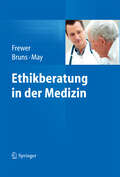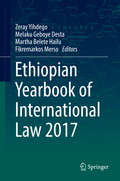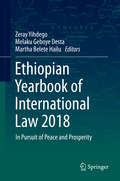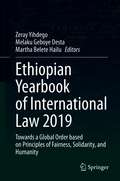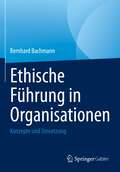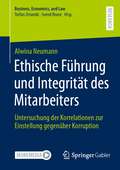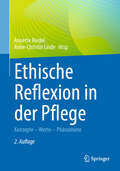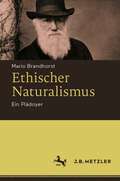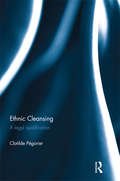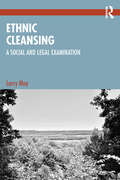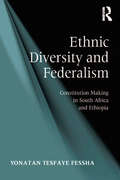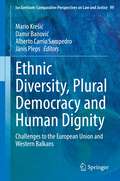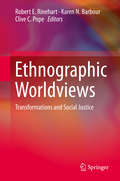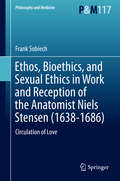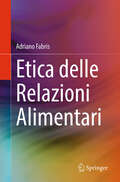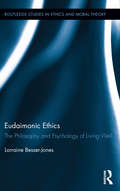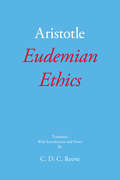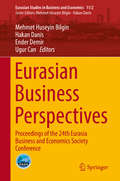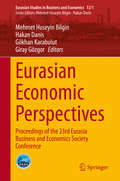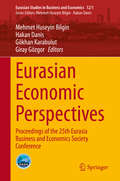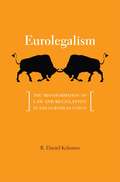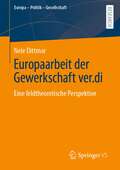- Table View
- List View
Ethik-Cafés im Sozial- und Gesundheitswesen: Sich über aktuelle Lebensfragen ethisch verständigen und austauschen
by Manfred Baumann Carola FrommSeit über zehn Jahren moderieren die Autor*innen mit hohem Zuspruch das Ethik-Café in Einrichtungen des Sozial- und Gesundheitswesens. Menschen aus unterschiedlichen Berufen, Patient*innen, An- und Zugehörige sowie ethisch Interessierte haben im Ethik-Café die Möglichkeit, aus ihrer persönlichen und beruflichen Perspektive ethische Fragestellungen zu diskutieren, die für ihren Alltag relevant sind. Ethik-Cafés sind niederschwellig, multiprofessionell, interdisziplinär. Die Teilnehmer*innen profitieren von dieser Perspektivenvielfalt. Das Buch stellt die Konzeption sowie deren Evaluation, die theoretischen und methodischen Voraussetzungen und in vielen Beispielen die praktische Umsetzung von Ethik-Cafés dar. Das entwickelte Vier-Phasen-Modell des ethischen Prozesses wird exemplarisch in 25 Ethik-Cafés zu Themen aus dem Sozial- und Gesundheitswesen angewendet und umgesetzt. Das Buch richtet sich an Mitarbeiter*innen und Führungskräfte im Sozial- und Gesundheitswesen, Lehrer*innen, Lernbegleiter*innen und Auszubildende in der generalistischen Pflegeausbildung, an Fort- und Weiterbildungsreferent*innen, Studierende, Ehrenamtliche sowie alle ethisch Interessierten.
Ethikberatung in der Medizin
by Florian Bruns Arnd T. May Andreas FrewerIn den letzten Jahren hat sich eine Vielfalt unterschiedlicher Gremien zur Ethikberatung entwickelt: vom Konsil mit einem einzelnen Berater bis zum Ethikkomitee. In dem Band werden die Ethikberatung, ihre Entwicklung und Anwendung, sowie die Gründung von Gremien in Krankenhäusern, Pflegeeinrichtungen, Hospizen und von niedergelassenen Ärzten anhand von Fallbeispielen erläutert. Dabei schlagen die Autoren eine Brücke zwischen traditioneller philosophischer Ethik und anwendungsbezogener klinischer Ethik. Auch rechtliche Fragen werden erörtert.
Ethiopian Yearbook of International Law 2017 (Ethiopian Yearbook of International Law #2017)
by Zeray Yihdego Melaku Geboye Desta Fikremarkos Merso Martha Belete HailuThe second volume of EtYIL brings together a number of articles and other contributions that, collectively, take EtYIL’s original mission of helping rebalance the narrative of international law another step forward. Like the first volume, this book presents scholarly contributions on cutting-edge issues of international law that are of particular interest to Ethiopia and its sub-region, as well as Africa and developing countries more generally. The major issues tackled include the interplay between national and international in the promotion and regulation of foreign direct investment in Ethiopia; the regulatory framework for the exploitation and development of petroleum resources and relevant arbitral jurisprudence in the field; the role of international law in ensuring the equitable sharing of transboundary resources, such as the waters of the River Nile, or in the delimitation of the continental shelf in the region; the efforts to establish the Continental Free Trade Area in Africa and the lessons that can be learnt from prior experiments; Africa’s policy towards the International Criminal Court and the feasibility of alternative means of serving justice in the case of grave crimes; and the UN’s peace-keeping operations in their North-South context. The issues addressed in the various contributions are mostly at the heart of live political, diplomatic and judicial activities today, and as such promise to shape the future of international law in the region and beyond. This volume not only takes a significant step further towards EtYIL’s mission, but also enriches it with fresh insights from perspectives that are not common in international law scholarship to this day.
Ethiopian Yearbook of International Law 2018: In Pursuit of Peace and Prosperity (Ethiopian Yearbook of International Law #2018)
by Zeray Yihdego Melaku Geboye Desta Martha Belete HailuEtYIL 2018 comes at a time when multilateralism and its underpinning norms of international law and institutions are under siege. At the same time, in 2018, Africa stood out for upholding multilateralism and international law. From the adoption of the Agreement establishing the African Continental Free Trade Area to the signing of peace agreements that brought to an end two decades of hostilities between Eritrea and Ethiopia, 2018 was indeed a remarkable year for international law in Africa. EtYIL 2018 covers some of these issues, including the Eritrea-Ethiopia Claims Commission decisions on jus ad bellum, jus in bello, evidentiary and procedural matters and the role of arbitration in upholding the international rule of law. Such new developments as the lifting of UN sanctions against Eritrea and the agreements signed between Eritrea and Ethiopia are also covered in this volume. The volume further devotes considerable attention to other legal issues including: the use and misuse of European patent law to the detriment of developing countries’ interests, sharing transboundary resources, production sharing agreements on extractives , evolving rules governing economic relations between Africa and the European Union in the context of Brexit, contract-farming in the African cocoa and chocolate industry, the International Criminal Court and human rights law, and cyber-attacks and the role of international law in tackling them. These chapters, authored by experts from Africa, Asia, Europe and North America not only bring new and diverse voices to the international law discourse; they also contribute to EtYIL’s overarching goal of contributing to the effort to rebalance the narrative of international law.
Ethiopian Yearbook of International Law 2019: Towards a Global Order based on Principles of Fairness, Solidarity, and Humanity (Ethiopian Yearbook of International Law #2019)
by Zeray Yihdego Melaku Geboye Desta Martha Belete HailuEtYIL 2019 comes out while the world is in the midst of a new coronavirus pandemic that has infected millions and killed thousands of people without distinction as to age, race, colour, or creed. As an attack on all humanity, Covid-19, the disease caused by the coronavirus, has challenged the fitness of the global order as never before, and its institutional and normative frameworks have been found wanting. As is often the case in such circumstances, when the WHO is denied resources to assist those countries or the WTO is unable to guarantee access to Covid-19 medical supplies and protective equipment, it is the poorest nations that suffer the most. EtYIL’s mission is to provide a platform for purpose-oriented scholarly analysis and debate on issues of particular significance for African countries such as Covid-19, disputes over Nile water resources, and Ethiopia-Eritrea relations. Although the pandemic came too late for this issue of EtYIL, we have managed to include two important articles that examine the subject from geostrategic and legal perspectives. EtYIL 2019 also addresses a number of other topical issues, including the responsibility of the UN Security Council (UNSC) in climate-related risks to least developed countries, the Global South’s approach to environmental protection, the challenges of international regulation of arms brokering, and the contributions of Martin Luther King, Jr. to Pan-Africanism and international human rights law. Finally, the Yearbook also continues its coverage of regional issues such as the evolving Ethiopia-Eritrea relations, Djibouti’s accession to the ICSID Convention; the trilateral negotiations between Ethiopia, Sudan and Egypt over the Grand Ethiopian Renaissance Dam and the U.S. meddling and the role of the UNSC on the issue have also been covered. As before, our contributors come from all over the world, to all of whom we extend our sincere appreciations.
Ethische Führung in Organisationen: Konzepte und Umsetzung
by Bernhard BachmannDieses Buch verknüpft die Theorie der ethischen Führung mit der Umsetzung verbesserter Führungspraktiken, insbesondere in hochgradig operativen Umgebungen. Es baut auf der Erkenntnis auf, dass schlechte Formen der Führung zu sinkender Motivation und folglich zu einem schlechten Arbeitsklima und zu Problemen bei der Arbeitsqualität in Organisationen sowie der Gesundheit der Mitarbeiter führen. Sie basiert auf einer qualitativen Studie mit 100 Tiefeninterviews, bei der eine induktive Kategorisierung verwendet wurde, um tiefgehende, reichhaltige und unaufgeforderte Daten aus einem hochentwickelten und fortschrittlichen Produktionsbetrieb zu erhalten.Das Buch gibt einen Überblick über den aktuellen Stand der Forschung auf diesem Gebiet und beschreibt den Aufbau der zugrunde liegenden Studie, die mit den beruflichen Erfahrungen des Autors verknüpft ist. Es erörtert das Forschungsdesign, seine Erprobung und seine Anpassung an die organisatorische Praxis. Das Buch stellt die Ergebnisse der Studie vor, führt in spezifische Fragestellungen ein, die sich aus der Analyse ergeben, diskutiert dann kritisch die Interpretation der Ergebnisse und gleicht diese mit theoretischen Konzepten ab. Ein Ergebnis der Studie ist, dass CSR und Ethik zu oft mit dem Schwerpunkt auf Governance, Verfahren und Berichterstattung umgesetzt werden, ohne die Führung auf allen Ebenen als entscheidende Komponente zu betrachten. Abschließend werden die aus den Ergebnissen abgeleiteten Schlussfolgerungen und Implikationen erörtert. Insgesamt wird in dem Buch kritisch bewertet, wie ethische Führung in Unternehmen praktisch umgesetzt werden kann, um Organisationen in besser geführte Institutionen zu verwandeln, die ethisches Verhalten an den Tag legen. Vorwort von Prof. Dr. James F. O'Kane, Dekan der Business School, Edinburgh Napier UniversityDieses Buch ist eine Übersetzung einer englischen Originalausgabe. Die Übersetzung wurde mit Hilfe von künstlicher Intelligenz (maschinelle Übersetzung durch den Dienst DeepL.com) erstellt. Eine anschließende menschliche Überarbeitung erfolgte in erster Linie in Bezug auf den Inhalt, so dass sich das Buch stilistisch anders liest als eine herkömmliche Übersetzung.
Ethische Führung und Integrität des Mitarbeiters: Untersuchung der Korrelationen zur Einstellung gegenüber Korruption (Business, Economics, and Law)
by Alwina NeumannCompliance-Management sowie präventive Lösungen gegen Unternehmenskriminalität sind aufgrund der aktuellen Gesetzesentwicklungen unumgänglich und heben die Bedeutung und Notwendigkeit einer gelebten Compliance-Kultur hervor. Alwina Neumann rückt im dem Zusammenhang Führungskräfte und ihre Verantwortung zur Förderung einer gelebten Compliance-Kultur in den Mittelpunkt und zeigt damit eine zusätzliche Stellschraube für insbesondere Korruptionsprävention auf. Mittels einer Querschnittsstudie mit Mitarbeitern in Deutschland werden korrelative Zusammenhänge zwischen ethischer Führung sowie Integrität und der Einstellung der Mitarbeiter gegenüber Korruption untersucht und Empfehlungen für die Praxis abgeleitet.
Ethische Reflexion in der Pflege: Konzepte – Werte – Phänomene
by Annette Riedel Anne-Christin LindePflegerisches Handeln begründen, reflektieren und professionell entscheiden! Dieses Buch richtet sich an Pflegende, Studierende von Pflege- und Gesundheitsstudiengängen und Weiterbildungsteilnehmende wie auch an Ethikberatende und Lehrende. Es setzt Reflexionsimpulse, bietet ethische Orientierung und Anhaltspunkte für ethisch gut begründete Entscheidungen im Praxisalltag. Pflegfachpersonen entscheiden oft situativ, denn viele Umstände erfordern schnelle Entschlüsse und vorausschauendes Handeln. Doch nach welchen Kriterien werden die vielfältigen ethischen Entscheidungen in der Pflegepraxis getroffen? Welche Werte oder Prinzipien leiten das Handeln und welche Strukturen unterstützen die ethische Analyse und Entscheidungsfindung? Die Autor*innen verdeutlichen ethische Aspekte von evidenzbasierten, fachlich fundierten Pflegehandlungen und die Notwendigkeit von systematischen Methoden für die ethische Entscheidungsfindung. Lernen Sie durch den Praxisbezug und Fallbeispiele und erlangen Sie mehr Sicherheit für die ethischen Herausforderungen in Ihrem Wirkungsbereich!
Ethischer Naturalismus: Ein Plädoyer
by Mario BrandhorstDas Buch entwickelt und verteidigt eine Form des ethischen Naturalismus. Es kreist um zwei Fragen, die durch einen Leitgedanken eng verbunden sind. Dieser Leitgedanke lautet, dass das Leben, das wir führen, mit allen seinen ethischen Aspekten als Teil der Natur anzusehen ist. Die erste Frage lautet, wie dieser Leitgedanke näher zu verstehen ist. Die zweite Frage lautet, was aus diesem Leitgedanken, so verstanden, folgt. Wie könnte das ethische Leben im Verlauf der Evolution des Menschen entstanden sein? Welche Folgen hätte das für uns? Die Untersuchung setzt bei Darwins Grundeinsichten an, die sie durch die weitere Entwicklung der Theorie der Evolution durch natürliche Selektion und moderne Hypothesen zur Erklärung der Entstehung des ethischen Lebens bis zum aktuellen Stand der Diskussion verfolgt. Wie sich zeigt, ist eine naturalistische Deutung nicht nur mit ethischem Denken und Handeln vereinbar, sondern trägt auch dazu bei, dessen Strukturen zu erklären. Relativiert werden dagegen die Ansprüche vieler Moraltheorien, die von überzogenen Erwartungen im Hinblick auf die Objektivität oder die Formalisierbarkeit des Ethischen geleitet sind. Den Abschluss bildet eine Fallstudie zur Menschenwürde, die nach der Deutung dieses Buchs zwar naturalistisch umgedeutet werden muss, aber als eine zentrale ethische Idee erhalten bleiben kann.
Ethisches Theater: Grundlagen des ethischen Managements und der strukturellen Transformation des Theaters
by Thomas SchmidtMit dem Konzept des Ethischen Theaters wird ein ganzheitliches Zukunftsmodell vorgestellt. Ausgangspunkt ist die Analyse der gegenwärtigen Krisen und der Komplexität in den deutschsprachigen Theatern, um die Grundlagen für ihren Transformationsprozess zu entwickeln. Mit dem Ethischen Theater wird ein Ziel dieses Prozesses vorgestellt: das ganzheitliches Zukunftsmodell einer Theater-Organisation des 21. Jahrhunderts, in der ethische Überlegungen erstmals in allen Prozessen handlungsleitend sind. Das Modell ist kompatibel mit den Interessen der Stakeholder und den wichtigen Reformprozessen, es ermöglicht die anstehende strukturelle Modernisierung der Theaterbetriebe. Unterstützt wird es durch das Konzept des Ethischen Theatermanagements, das erstmals über die klassischen Funktionen hinaus auch Aspekte der Diversität, der Nachhaltigkeit, der Ethik und der Zukunftsfähigkeit adressiert. Mit den erweiterten Funktionen des ethischen Managements werden auch weitere Möglichkeitsräume für die Zukunft der Kultur-Organisationen eröffnet.
Ethnic Cleansing: A Legal Qualification
by Clotilde PegorierThis book confronts the problem of the legal uncertainty surrounding the definition and classification of ethnic cleansing, exploring whether the use of the term ethnic cleansing constitutes a valuable contribution to legal understanding and praxis. The premise underlying this book is that acts of ethnic cleansing are, first and foremost, a criminal issue and must therefore be precisely placed within the context of the international law order. In particular, it addresses the question of the specificity of the act and its relation to existing categories of international crime, exploring the relationship between ethnic cleansing and genocide, but also extending to war crimes and crimes against humanity. The book goes on to show how the current understanding of ethnic cleansing singularly fails to provide an efficient instrument for identification, and argues that the act, in having its own distinctive characteristics, conditions and exigencies, ought to be granted its own classification as a specific independent crime. Ethnic Cleansing: A Legal Qualification, will be of particular interest to students and scholars of International Law and Political Science.
Ethnic Cleansing: A Social and Legal Examination
by Larry MayPutting forward the argument that the strength of democracies can be measured in how well minorities – especially ethnic and racial minorities – are treated by the majority, Larry May’s Ethnic Cleansing maintains that unjust ethnic cleansing is one of the greatest internal challenges to the modern institutions of pluralistic and multicultural states.In order to determine what constitutes the crime of ethnic cleansing, this book details crucial conceptual issues around the topic, such as what ethnicity means, what ethnic cleansing claims to achieve, why these acts are invariably harmful, and the conditions of restitution, reparation, and reconciliation – affirming that ethnic cleansing must be countered by existing institutions such as the International Criminal Court, which is uniquely situated to prosecute ethnic cleansing.The first major study to analyze ethnic cleansing from an explicitly normative and conceptual perspective in the last decade, the increase in number and complexity of cases of ethnic cleansing makes this a timely book to understand the challenges that confront contemporary society.
Ethnic Diversity and Federalism: Constitution Making in South Africa and Ethiopia
by Yonatan Tesfaye FesshaHow federalism can be used to provide recognition and accommodate ethnic groups is an important topic, not only in Africa, but in multi-ethnic communities around the world. Examining how institutions of multi-ethnic states have been designed to accommodate ethnic diversity while at the same time maintaining national unity, this book locates institutional responses to the challenges of ethnic diversity within the context of a federal arrangement. It examines how a federal arrangement has been used to reconcile the conflicting pressures of the demand for the recognition of distinctive identities, on the one hand, and the promotion of political and territorial integrity, on the other. Comparative case studies of South Africa and Ethiopia as the two federal systems provide a contrasting approach to issues of ethnic diversity. Suggesting new ways in which federalism might work, the author identifies key institutions lessons which will help to build an all-inclusive society.
Ethnic Diversity, Plural Democracy and Human Dignity: Challenges to the European Union and Western Balkans (Ius Gentium: Comparative Perspectives on Law and Justice #99)
by Jānis Pleps Damir Banović Mario Krešić Alberto Carrio Sampedro“Given their ethnic diversity, to what extent, and at what cost and benefit to human dignity, can European countries adopt and adapt plural democracy?” The contributors to this volume offer answers to this question from a variety of multidisciplinary perspectives within the framework of the integral theory of law and the state. Their shared aim is to explain legal phenomena in the context of other relevant issues and to identify, analyse and critique conceptualizations, problems and situations. This volume is rooted in the historical and contemporary European experience with special cases from Bosnia and Hercegovina, Croatia, Latvia, Slovenia, Spain and Canada which are relevant for understanding the European problem. Solutions to the problem are sought through innovative interpretations of the rule of law, democracy and human dignity, which are followed by argumentation about how these concepts, when recognized as European legal principles, can be implemented in order to avoid ethnic conflicts.Following an introduction that defines the problem at the centre of the book and explains how legal theory can be used to address it, the book consists of eleven contributions divided into three thematic sections. The first covers topics concerning the European principles which can help avoid ethnic conflicts: the principle of compulsory adjudication in interstate relations, the principle of democracy, and principles regarding the recognition of individual and collective identities. These European principles are then investigated by drawing on legal and political theories. The second section presents three ways of conceptualizing ethnical needs in multi-ethnic states: asymmetric federalism, dêmoicratic account and cooperative federalism. The third and final section elaborates on issues concerning the protection of minority rights: the role of judicial ideology in protecting minority rights, citizenship, the EU mechanism for the protection of minority rights, and the importance of remembering tragic events affecting minorities.
Ethnicity and International Law
by Mohammad ShahabuddinEthnicity and International Law presents an historical account of the impact of ethnicity on the making of international law. The development of international law since the nineteenth century is characterised by the inherent tension between the liberal and conservative traditions of dealing with what might be termed the 'problem' of ethnicity. The present-day hesitancy of liberal international law to engage with ethnicity in ethnic conflicts and ethnic minorities has its roots in these conflicting philosophical traditions. In international legal studies, both the relevance of ethnicity, and the traditions of understanding it, lie in this fact.
Ethnographic Worldviews
by Robert E. Rinehart Karen N. Barbour Clive C. PopeThis book discusses ethnography from the three points of view of Emerging Methodologies, Practice and Advocacy, and Social Justice and Transformation, with an over arching emphasis on researchers' and participants' worldviews. While these three thematic threads cut across each other, the actual chapters will be located so that the reader understand many of the current issues and concerns--with specific exemplars from around the globe--for ethnographers. 'Ethnographic Worldviews: Transformations and Social Justice' will have its "finger on the pulse" of contemporary ethnography. Chapters demonstrate up-to-the-moment awareness of ethnographic methods, concerns, and subject matters within contemporary ethnographic writing. Authors are deeply engaged in both their subject matter and their method. For example, discussion of ethical issues surrounding visual methods of "collecting" for photo-ethnographies is anticipated as a potential hot topic for this book. Unlike other ethnographic books which often suggest "giving voice to others", this book will actually give voice to a wide variety of perspectives, from the points of view of researchers.
Ethos, Bioethics, and Sexual Ethics in Work and Reception of the Anatomist Niels Stensen (1638-1686)
by Frank SobiechThis book offers a unique and comprehensive outline of the ethos, the bioethics and the sexual ethics of the renowned anatomist and founder of modern geology, Niels Stensen (1638-1686). It tells the story of a student who is forced to defend himself against his professor who tries to plagiarize his first discovery, the "Ductus Stenonis": the first performance test for the young researcher. The focal points are questions of bioethics, especially with regard to human reproduction, sexual ethics, the beginning of life and the ensoulment of the embryo, together with frontiers of pastoral care. The book delineates Stensen's ethos as well as its medico-ethical and theological implications and reception by researchers and physicians from the 17th century until today, and asks about his lasting significance. Despite dating back more than 300 years, Stensen's character and his work offer up surprisingly topical answers to current questions on the nature of professional ethics in medical science and practice. Furthermore, "Ethos, Bioethics, and Sexual Ethics in Work and Reception of the Anatomist Niels Stensen (1638-1686): Circulation of Love" is the first academic book on bioethics and sexual ethics with a foreword by the Prefect of the Congregation for the Doctrine of the Faith. A fascinating book for bioethicists, physicians, members of health professions, scientists, and theologians.
Etica delle Relazioni Alimentari
by Adriano FabrisQuesto libro presenta e discute alcuni problemi di fondo che emergono oggi nelle relazioni alimentari e che riguardano i nostri stili di vita. I primi tre capitoli si concentrano sulle questioni che concernono l'alimentazione e sul rapporto con ciò che possiamo o non possiamo mangiare, per motivi etici, religiosi o semplicemente collegati al nostro benessere. Il quarto capitolo tratta dell'atto del bere e del nostro rapporto con l'acqua, nell’ottica della sostenibilità, della giustizia, del corretto uso e dell’equa distribuzione delle risorse idriche. In generale, l’idea che viene sostenuta nel libro è che per gli esseri umani gli atti del mangiare e del bere non dipendono dalla volontà del soggetto, ma si svolgono in contesti di relazione già dati e mettono in gioco, o impediscono, ulteriori relazioni: con altri esseri viventi, con altri esseri umani, con noi stessi. Tali relazioni possono svilupparsi bene oppure male. Se sono attuate male risultano distruttive. Bisogna capire come ciò accade e agire di conseguenza. L’etica ci aiuta a farlo, facendoci riflettere su questi problemi e individuando soluzioni concrete. Scritto per studenti universitari e per studiosi di etiche applicate, il libro è una lettura stimolante e provocatoria anche per un pubblico più ampio.
Eudaimonic Ethics: The Philosophy and Psychology of Living Well (Routledge Studies in Ethics and Moral Theory)
by Lorraine L BesserIn this book, Lorraine Besser-Jones develops a eudaimonistic virtue ethics based on a psychological account of human nature. While her project maintains the fundamental features of the eudaimonistic virtue ethical framework—virtue, character, and well-being—she constructs these concepts from an empirical basis, drawing support from the psychological fields of self-determination and self-regulation theory. Besser-Jones’s resulting account of "eudaimonic ethics" presents a compelling normative theory and offers insight into what is involved in being a virtuous person and "acting well." This original contribution to contemporary ethics and moral psychology puts forward a provocative hypothesis of what an empirically-based moral theory would look like.
Eudemian Ethics (The New Hackett Aristotle)
by AristotleThis new translation of Aristotle's Eudemian Ethics, noteworthy for its consistency and accuracy, is the latest addition to the New Hackett Aristotle series. Fitting seamlessly with the others in the series, it enables Anglophone readers to read Aristotle&’s works in a way previously impossible. Sequentially numbered endnotes provide the information most needed at each juncture, while a detailed Index of Terms guides the reader to places where focused discussion of key notions occurs.
Eurasian Business Perspectives: Proceedings of the 24th Eurasia Business and Economics Society Conference (Eurasian Studies in Business and Economics #11/2)
by Mehmet Huseyin Bilgin Hakan Danis Ender Demir Ugur CanThis volume of Eurasian Studies in Business and Economics includes selected papers from the 24th Eurasia Business and Economics Society (EBES) Conference, held in Bangkok. The theoretical and empirical papers gathered here cover diverse areas of business and management from different geographic regions; yet the main focus is on the latest findings on evolving marketing methods, analytics, communication standards, and their effects on customer value and engagement. The volume also includes related studies that analyze sustainable consumer behavior, and business strategy-related topics such as cross-border restructuring, quality management standards, and the internationalization of SMEs.
Eurasian Economic Perspectives: Proceedings of the 23rd Eurasia Business and Economics Society Conference (Eurasian Studies in Business and Economics #13/1)
by Mehmet Huseyin Bilgin Hakan Danis Gökhan Karabulut Giray GözgorThis book presents selected papers from the 23rd Eurasia Business and Economics Society (EBES) Conference, held in Madrid, Spain. While the theoretical and empirical papers presented cover diverse areas of economics and finance in different geographic regions, the main focus is on the latest research concerning international trade, public economics, and regional studies. The book also includes studies on the economics of innovation, inequality and tourism.
Eurasian Economic Perspectives: Proceedings of the 25th Eurasia Business and Economics Society Conference (Eurasian Studies in Business and Economics #12/1)
by Mehmet Huseyin Bilgin Hakan Danis Gökhan Karabulut Giray GözgorThis volume of Eurasian Studies in Business and Economics includes selected papers from the 25th Business and Economics Society (EBES) Conference, held in Berlin, Germany, in May 2018. While the theoretical and empirical papers presented cover diverse areas of economics and finance from different geographic regions, the main focus is on the latest research in the economics of innovation, investment and risk management together with regional studies. The book also includes studies on law and regulation themes such as economic offences by women, formation of contracts via the internet and public tender for residents of communes.
Eurolegalism: The Transformation of Law and Regulation in the European Union
by R. Daniel KelemenDespite western Europe's traditional disdain for the United States' "adversarial legalism," the European Union is shifting toward a very similar approach to the law, according to Daniel Kelemen. Coining the term "eurolegalism" to describe the hybrid that is now developing in Europe, he shows how the political and organizational realities of the EU make this shift inevitable. The model of regulatory law that had long predominated in western Europe was more informal and cooperative than its American counterpart. It relied less on lawyers, courts, and private enforcement, and more on opaque networks of bureaucrats and other interests that developed and implemented regulatory policies in concert. European regulators chose flexible, informal means of achieving their objectives, and counted on the courts to challenge their decisions only rarely. Regulation through litigation-central to the U.S. model-was largely absent in Europe. But that changed with the advent of the European Union. Kelemen argues that the EU's fragmented institutional structure and the priority it has put on market integration have generated political incentives and functional pressures that have moved EU policymakers to enact detailed, transparent, judicially enforceable rules-often framed as "rights"-and back them with public enforcement litigation as well as enhanced opportunities for private litigation by individuals, interest groups, and firms.
Europaarbeit der Gewerkschaft ver.di: Eine feldtheoretische Perspektive (Europa – Politik – Gesellschaft)
by Nele DittmarIn der sozialwissenschaftlichen Debatte wird oft ein pessimistisches Bild der Bedingungen und Perspektiven europäischen gewerkschaftlichen Handelns gezeichnet. Selten wurde aber bisher in eine nationale Gewerkschaft hineingeschaut und gefragt, ob und inwiefern die innergewerkschaftlichen (Macht-)Verhältnisse ihre europabezogene Arbeit beeinflussen. Diese Arbeit setzt dort an und lenkt auf der Suche nach den Möglichkeiten und Grenzen gewerkschaftlicher Interessenvertretung in Europa den Blick in eine nationale Gewerkschaft hinein. Am Beispiel der Vereinten Dienstleistungsgewerkschaft ver.di bringt dies einerseits europabezogene Praktiken zum Vorschein, die aus einer Makroperspektive verdeckt bleiben. Andererseits werden neue Erkenntnisse zu Hindernissen gewerkschaftlicher Europaarbeit gewonnen, die in den innerorganisatorischen Strukturen und Machtrelationen selbst begründet sind. Für den Blick in die Gewerkschaft wird in dieser Arbeit eine feldtheoretische Perspektive eingenommen. Damit wird ihre „Europaarbeit“ durch das Zusammenspiel der Position der Gewerkschaft in anderen Feldern (wie dem der deutschen und der europäischen Arbeitsbeziehungen) und den Kräfteverhältnissen innerhalb der Gewerkschaft selbst erklärt.

